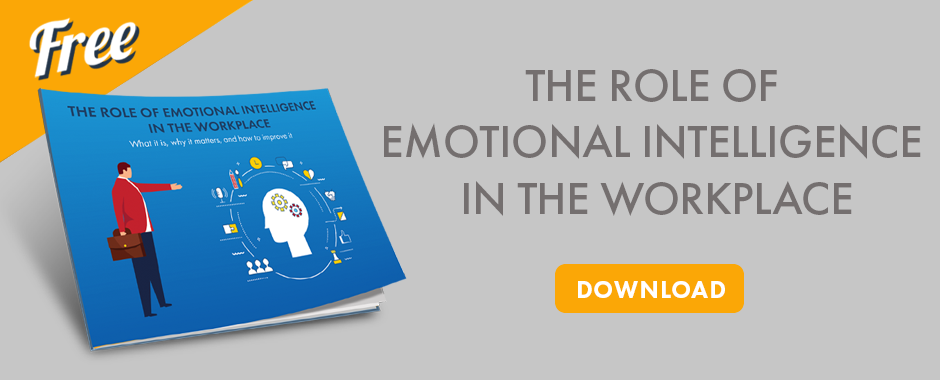What is emotional intelligence, and what role does it play in the workplace? In this article, we will explain what emotional intelligence is, what role it plays in the workplace, the signs of emotional intelligence, and how you can improve your emotional intelligence.
What Is Emotional Intelligence?
Emotional intelligence (EQ) is defined as "the capacity to be aware of, control, and express one's emotions, and to handle interpersonal relationships judiciously and empathetically."
EQ allows you to monitor your own emotions and those of the people around you. It helps you to discriminate between different emotions in order to guide your thinking and behaviour. Someone with a high level of EQ will be able to understand why they feel how they do, and how their emotions can affect other people (think of someone who shouts under stress versus someone who remains calm and collected). EQ can be developed and improved over time.
There are 5 characteristics that make up emotional intelligence:
- Self-Awareness: Knowing how you feel and how your emotions and your actions can affect the people around you.
- Self-Regulation: Staying in control despite experiencing varying emotions.
- Motivation: The general desire or willingness of someone to do something.
- Empathy: The ability to understand and share the feelings of another.
- Social Skills: The skills we use to communicate and interact with each other, both verbally and non-verbally.
What Role Does Emotional Intelligence Play in the Workplace?
If you're practicing EQ, you'll know how your emotions and actions affect the people around you. In the workplace we are exposed to many different stressors, including: project timelines, personality differences, demands, and so on. By keeping your emotions under control, you're able to better manage and maintain your relationships within the workplace, and handle stressors as they appear. This not only allows you to be more productive at work, but also to go home at the end of the day in a better mood.
What are the Signs of Emotional Intelligence?
Here are some signs of high emotional intelligence:
- Thinking about your feelings and the feelings of those around you
- Taking a moment to reflect before reacting
- Striving to control your thoughts
- Benefiting from criticism, even when delivered poorly
- Showing authenticity
- Praising others
- Showing empathy
- Giving helpful feedback
- Forgiving others and yourself
- Being able to apologize
- Keeping your commitments
- Helping others
- Protecting yourself from emotional sabotage
- Sticking to your values
- Striving to improve your communication skills
How Can You Improve Emotional Intelligence?
- Slow down: When you experience a strong emotion, take a moment to examine why. This will allow you to choose how you would like to react.
- Know your values: Know where you will not compromise, and why. By knowing your own "code of ethics" it will allow you to react more easily when you face a moral or ethical question.
- Hold yourself accountable: Don't blame others when something you do goes wrong. Know your role in the situation, and face the consequences.
- Practice being calm: In your next challenging situation take a moment to become aware of how you would like to react. If your instinct is to shout, try deep-breathing to calm yourself. You could also try writing down your feelings and tearing the paper up to get out your frustration without taking it out on a colleague.
- Remember why you started: Why did you choose this job, or start this business? What were the things you wanted from it, and loved about it? Keep these in your mind so they are easy to remember when a stressful situation arises.
- Find the good: Being optimistic can be difficult, but it can make it easier to handle many emotional situations. Try to find at least one good thing in a challenge you face.
- Put yourself in someone else's shoes: Remember that not everyone has the same perspective of you. If you consider their position, does it make the situation easier for you to understand? Knowing why someone is acting how they are can help us formulate a more proactive response.
- Watch body language: When you're feeling frustrated, what sort of body language do you adopt? You may be crossing your arms or rolling your eyes. Even though you may not be speaking your mind, your body language can say a lot to a colleague about how you're really feeling.
- Learn conflict resolution strategies: Learn how to resolve conflicts with colleagues, team members, customers, vendors, and any other stakeholders.
- Improve your communication: Do you think about how your message will come across before stating it? Do you try to see other people's perspectives? Do you use the right medium to communicate? Are you anticipating possible causes of confusion before you start a discussion? Reflecting on your communication style and areas for improvement can help regulate the emotions that arise during meetings, reviews, and so on.
Practicing emotional intelligence can help improve company culture, and your own well-being both in and out of the workplace. Discovering your emotional triggers, and actively regulating them can help you have a more enjoyable, productive, and fulfilling day at work.
Learn more about emotional intelligence on our new podcast episode:

Get your free copy of The Role of Emotional Intelligence eBook:
